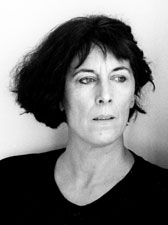At GLF, you’re going to have to put a little effort into finding Pauline Melville – the retiring author has always preferred to keep out of the spotlight. “As a writer I am always aware that the more you are in the limelight, the less you see because the gaze is turned upon you,” she says frankly, adding “besides, I think celebrity is a danger to anyone it befalls.”
Born in Guyana, Pauline is the author of ‘Shape-Shifter’ (1990), a collection of short stories that explore life in a post-colonial Caribbean. It won her the Commonwealth Writers Prize (Overall Winner, Best First Book) and the Guardian Fiction Prize. Her first novel - ‘The Ventriloquist’s Tale’ (1997) - also garnered international acclaim, winning the Whitbread First Novel Award and making the shortlist for the Orange Prize for Fiction. In it, Pauline chose to focus on the relationship between European colonisers and Guyanese Amerindians, telling the tale through the eyes of two siblings.
The novel won praise from critics for its exploration of the nature of fiction and storytelling. She has also worked as an actress, appearing in films such as ‘Mona Lisa’ and British television programmes including the BBC Television comedy series ‘The Young Ones’. Having been a poet for some, Pauline says she doesn’t really write much poetry anymore, but that her scribbled notes are full of poetic images. She is currently gathering a new collection of short stories to follow her most recent publication, ‘The Migration of Ghosts’ (1998).
“I am very excited about visiting Sri Lanka as I have never been so far east before,” she says. “Other writers have told me that the festival is wonderful and I am longing to dip my toes into a culture which is totally unfamiliar to me – except through the writings of people like Michael Ondaatje and Romesh Guneseekera.”
What are you reading right now?
‘A Distant Star’ by Roberto Bolano. I am reading it because I am interested in comparing the world-wide joy we all experienced at the escape of the trapped Chilean miners with a story set in the more sinister political landscape of Chile’s recent past.
Where do you like to read?
I read curled up in my study on a sofa-bed by the window where the light falls. However, I am rarely without a book and carry one with me to read on the bus or plane or waiting in a queue somewhere. I feel bereft and annoyed if I forget to take one with me.
Your native Guyana has a strong presence in your books. Could you share with us some books written either by Guyanese writers or about Guyana that you particularly admire?
From an older generation of Guyanese writers I would recommend Wilson Harris’s ‘Palace of the Peacock’, a visionary and commanding novel deeply rooted in the landscape and culture of Guyana.
I also want to mention a brilliant but little known poet called Martin Carter one of whose many volumes, ‘Poems of Resistance’, came out of the anti-colonial struggles of the fifties. Both these writers avoided self-promotion and celebrity but their work shines out all the same. Other good contemporary Guyanese writers are John Agard, Grace Nichols and Fred d’Aguiar.
In interviews you have expressed a fascination with people who transgress the rules. How does this play out in your own fiction? Who are your favourite rebels in literature?
It is quite true that I have an interest in people who push the limits and boundaries of society in some way. I don’t know why, but it is there in my fiction. ‘The Ventriloquist’s Tale’ involves a brief, passionate affair between a brother and sister that produces a strange and magical child. ‘Eating Air’ explores the idea of both personal violence and violence in pursuit of political rebellion or revolution.
As for my favourite rebels in literature, well I suppose Heathcliff in Emily Bronte’s ‘Wuthering Heights’ is the first one that comes to mind. I also love comedy and I think The Good Soldier Schweik is a wonderful example of rebellion against the stupidity of war through passive resistance and dumb insolence. A brilliant depiction of a rebel who embodies pure evil is Stavrogin in Dostoevsky’s ‘The Possessed’ – but I wouldn’t want to come across him in real life.
The Wapichan Dictionary sounds fascinating and quite challenging to put together. Could you share some of your experiences compiling the dictionary?
That is a very long story. I am of mixed-race descent and part of my Guyanese family background is Amerindian. I decided with a cousin to document the Wapichan language as there is a danger of it disappearing. It was a fascinating project because the language is pre-Columbian and so it provides a glimpse into a very different way of looking at the world. We travelled in the remote savannahs of Guyana collecting words.
After we’d finished distributing the books to Amerindian villages I had to ride on horseback, after a violent Amazonian storm, through the starlit night to catch my flight back to the coast and then on to London. I’ve written fully about the dictionary in the Financial Times Magazine and also in Wasafiri magazine. |



